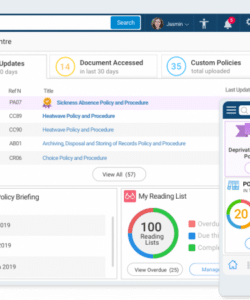View the system
Dashboard
Navigate your policies, procedures, compliance tools and more. Everything you need for compliance is located on your dashboard.

- Simple to use online interface for all infection control activity
- Fully comprehensive approach – Up to 114 pages with 15+ easy to follow policies and procedures, available in Word and PDF
- Upload your own documents to supplement the system for even more comprehensive and personalised infection control and CQC compliance tool
- All of your policies are kept up to date and accessible 24/7 online and through your mobile app by all of your staff.
The rise of MRSA and resistant infections have brought infection control management to the forefront of care provider responsibilities. With NICE guidelines specifically aimed at the audience covered by CQC registration, and QCS customers, there is no room for lack of knowledge or complacency. The CQC themselves, in their consultation for the CQC Fundamental Standards, set the registration requirement at “How well are people protected by the monitoring of prevention and control of infection?”
Ongoing Support and Guidance for Infection Control
Simple to use
Online interface for all infection control activity
All policies required
To manage your staff in line with infection control requirements
Easy upgrade path
From the infection control module to the full management system
Assessments and action plans
Covering premises, procedures and equipment
Upload your own documents
To supplement the system for an even more comprehensive and personalised adult social care compliance tool
Online customisation
Lets you change any of the up to 130+ fields that are customised to your business
Weekly update email
System compliant or not, number of updated & unread documents, recent staff logins plus e-mail notifications for care system updates
Fully comprehensive approach
Up to 114 pages with 15+ easy to follow policies and procedures, available in word and pdf
Supports QA
Meets the CQC definition of quality assurance for on-going compliance
Provides compliance
In accordance with current infection control policies, and mental health and other legislation that protects vulnerable adults.
Fully customised documents
As required by the CQC, documents are specific to your organisation and not generic
Peace of mind
Know you are compliant, and that we will keep you up to date with new infection control requirements
Saves Time
How long would it take you to create and update Infection Control guidance?
Start Free Trial Buy NowInfection Control
It is essential to implement the correct infection control policies and procedures, both through the Infection Control Policy and Procedure itself, and the infection control procedures embedded throughout the management system.
The QCS Infection Control Module is continually revised so that it is up to date and in step with regulatory change and adaptations to best practice. This enables you to:
- Carry out suitable risk assessments which detail the real risks present within the care setting.
- Create and use a reporting system which allows care workers and Service Users to report and record all incidents which may compromise infection control.
- Constantly review existing policies and practices to ensure that they are up to date and fit for purpose.









